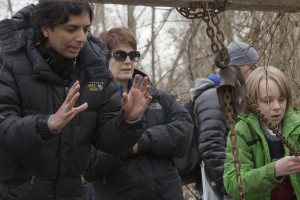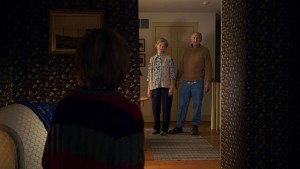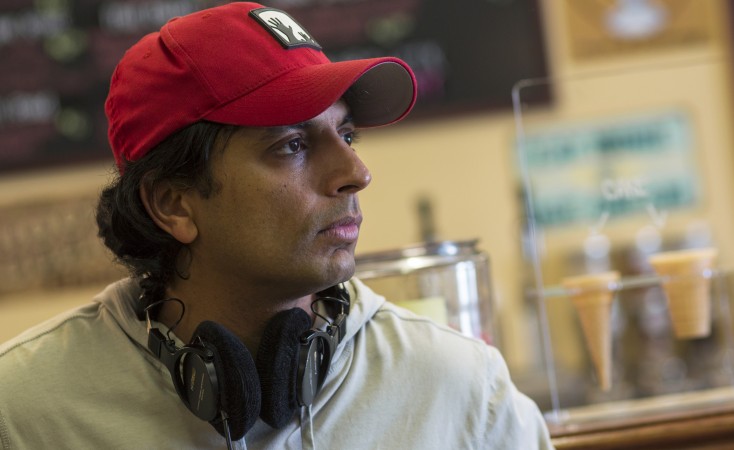
(L to R) Writer/Director/Producer M. NIGHT SHYAMALAN, cinematographer MARYSE ALBERTI and ED OXENBOULD as Tyler on the set of THE VISIT. ©Universal Studios. CR: John Baer.
By ANGELA DAWSON
Front Row Features
HOLLYWOOD—M. Night Shyamalan, the filmmaker behind such contemporary suspense-horror films as “The Sixth Sense” and “Signs,” joins forces with small budget horror franchise master Jason Blum (“Insidious,” “Paranormal Activity”) to make “The Visit,” which blends comedy and horror into a creepy package.
The Philadelphia-based filmmaker says he and Blum first began talking about collaborating four years ago. Blum suggested to Shyamalan how to bring his dark vision to audiences in a cost-conscious way. Blum, through his Blumhouse Productions, serves as producer on the horror flick.
“The Visit” tells the story of a pair of teens that go on a trip to visit their grandparents, whom they’ve never met before. The older folks seem pleasant enough at first, but then start acting increasingly peculiar. The teens, played Ed Oxenbould and Olivia DeJonge, grow suspicious of their elders, and plot to escape. But can they flee the house before their lives are endangered?
Shyamalan spoke at a press conference about making “The Visit,” working with Blum and what’s ahead.
Q: The pairing of you and Jason is interesting. What drew you to work with each other?
Shyamalan: He’s the perfect foil for me because he’s inspirable. I know this is a business. I know this about art and commerce. But it’s tough because we’re selling art. You can go to extremes and just regard yourself as an artist or go to the opposite end and sell out. To have a partner that’s advising me on the business side and he’s telling me that all he cares about is being inspired, that makes me feel safe. I know he won’t betray the individuality of the movie. He is the champion of movies that people didn’t think would become something. There is something that is universal in their reach. I’m super-confident about creative stuff but not confident about human interactions that he’s very good at. He was always assuring me that everything would be all right. So it’s been a wonderful pairing.
Q: What difference did you notice in making a smaller budget film?
Shyamalan: The wonderful part of making smaller movies is that the limitations sometimes create opportunities. You can’t leave locations very often when you’re making a smaller-budget movie so I found this farmhouse. We shot this in Pennsylvania near where I live. It was a farm that was going into foreclosure. I asked the bank if I could rent it for six months before they put it up for auction. I told them once I make the movie, you can sell it for more. And they agreed to it. I had the house from pre-production. I would rehearse the actors in the rooms, on the stairs and in the kitchen.
There were a few times when I went to the house alone—it was really creepy, actually. I’d just sit there and think about the shots. It was really different because I could plan it out and decide where I want to place the camera. I’d take copious notes. That’s how I like to make movies. The challenge for me was to make it look spontaneous.
Q: Did you allow the kids to shoot some of the shots?
Shyamalan: There was one part that the kids shot. We had a problem one day where we wanted to shoot grandma chasing the kids in the crawl space under the house. The camera operator was too big to fit in the space. So the grips tried (and failed) to build a contraption. Then, I looked over at Ed (Oxenbould, who plays Tyler) and said to him, “Why don’t you just hold the camera?” And he was like, “Yeahhh!” So he just got underneath the house with it and did all the camerawork on that scene. He was so proud that day.
Q: What was the inspiration for this?
Shyamalan: Basically, when I’m writing something I think about what the subject is of the piece. The subject of the piece is our fear of getting old, which is a variation on our fear of dying. I have to think there’s a primal thing that we’re talking about, even though it’s fanciful and we’re doing it in a tongue-in-cheek manor. But what is the thing that makes it scary? What is the psychology behind it?
I met my wife at NYU at an abnormal psychology class because I love psychology and finding out why do we do things, what does the color red do and what does this camera angle do? All of that stuff. That’s the primal thing of it is we’re scared of being old. Playing on that is a powerful conceit.

(L to R) Tyler (ED OXENBOULD) is terrified by Nana (DEANNA DUNAGAN) and Pop Pop (PETER MCROBBIE) in THE VISIT. ©Universal Studios.
Q: When you were younger, did you have a fear of old people?
Shyamalan: My grandparents have passed away but they were classic Indian grandparents. My grandmother would put so much powder on her face she almost looked like a kabuki player so she was kind of scary looking to me. My grandfather wore dentures so he would take them out sometimes and try and scare me. He was very mischievous too. So I would try to scare them when I got a little older. Now I feel bad about it. My parents, who are now grandparents, haven’t seen the movie yet, and I’m nervous for them to see it at the premiere, I don’t know what they’re going to think about it, like the scene in the shed with the dirty diaper and all that stuff, so we’ll see. (He laughs.)
Q: Peter McRobbie and Deanna Dunagan, who play the grandparents, have extensive stage experience but aren’t well-known movie actors. Were you looking specifically to hire faces that most moviegoers wouldn’t recognize?
Shyamalan: We take B-genre movies and treat them like they’re A-dramas. We get top-notch cinematographers, the best actors around, but the story just happens to be about aliens or ghosts or crazy people, whatever it is. My directing style is long takes. The longer take I can do without cutting. I choose whose scene it is and follow that person. So it helps to have a theater-trained actor who is used to getting up on the stage every day and committing to that performance. I need actors who are versed in that style, who don’t edit themselves. Because I do long takes, there’s a trust that happens. Theater actors know it’s working when everyone’s connected in this magic of storytelling. That’s my philosophy. I love stage actors.
Q: How did you find Olivia DeJonge, who plays Becca and Ed Oxenbould, who plays Tyler? How did you get such strong performances from them?
Shyamalan: I can’t take too much credit for what they did. We were just very lucky. Interestingly enough, the two kids in this movie are from Australia. It made sense to cast them because U.S. audiences haven’t seen them that much. Australia’s another source of untapped talent. They’re speaking with an American accent was pretty easy for them and they didn’t lose their palate of colors as actors.
Making movies is an act of faith. When I write characters, I simply pray that these individuals exist in the world. I’m not looking for a 12-year-old Daniel Day-Lewis who transforms from one role to the next; I’m looking for these kids to exist somewhere. Their characters are who they are in real life, and they’re going to do a variation on the character for me. I need them to be super-intelligent because we’re going to talk like director and actors.
I also require the families to be healthy, positive families. They’re my co-directors with the kids. Sometimes, when I don’t have the vocabulary to direct the kid, and I need somebody who’s a master of his or her vocabulary to get through, so I’ll call the parent and tell them what I need and have them convey the information to the young actor.
Q: Some of your recent films didn’t connect as much with audiences as your previous films. In linking up with horrormeister Jason Blum, was it a conscience decision to try something different?
Shyamalan: I’m a philosophical guy. Each movie is a new relationship. You have to start fresh every time. You can’t look back and analyze what didn’t go right and what went right. As an artist, the second you try to conform and be something other than what you are, your light diminishes. To go and make a small movie, which never strikes me as less than, it’s just the love of cinema. As long as I’m being irreverent, funny and gross and emotional and dark as I am and let it be me, that’s what I want to do. It’s a wonderful thing to walk away and say “The Visit” is 100 percent me, and whatever comes from it, comes from it. How can it be wrong? Right? Because it was me. That’s my philosophy.
Even now, as I’m finishing writing my next screenplay that hopefully we will do together with (Jason Blum), some people are asking, “Is it as funny as ‘The Visit?’” I have to put that out of my head. The idea behind “The Visit,” was to strip everything away and just have fun with it. It was the funnest movie I’ve done.
Q: There are certainly a lot more laughs in this one than in your previous horror movies. Was your intention to make a horror-comedy?
Shyamalan: Yeah. I did a (horror/sci-fi genre) TV show called “Wayward Pines” this year, and it went well. People are offering me sci-fi, scary things. And I want to make something like “Sex and the City,” and nobody’s offering me that. (He laughs.) “The Visit” is a balance of who I am. I’m mischievous. I’ve written comedy a couple of times, like “Signs,” there was some comedy. Occasionally, I put it in some of my movies. I enjoy making people laugh. I hope that have that as a thread in my movies. I think it’s a wonderful, great foil.
Q: What’s the status of “Wayward Pines.” If Fox orders a second season, are you going to direct some of the episodes?
Shyamalan: I’m not sure. I’m not sure. We’re just talking now, getting it all together.





